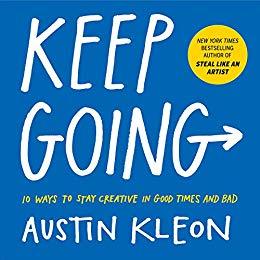More on this book
Community
Kindle Notes & Highlights
by
Austin Kleon
Read between
January 29 - January 30, 2025
Everything got better for me when I made peace with the fact that it might not ever get easier.
The world is crazy. Creative work is hard. Life is short and art is long.
“None of us know what will happen. Don’t spend time worrying about it. Make the most beautiful thing you can. Try to do that every day. That’s it.”
“What would you do if you were stuck in one place, and every day was exactly the same, and nothing that you did mattered?”
We have so little control over our lives. The only thing we can really control is what we spend our days on. What we work on and how hard we work on it. It might seem like a stretch, but I really think the best thing you can do if you want to make art is to pretend you’re starring in your own remake of Groundhog Day: Yesterday’s over, tomorrow may never come, there’s just today and what you can do with it.
“Relying on craft and routine is a lot less sexy than being an artistic genius. But it is an excellent strategy for not going insane.”
A daily routine will get you through the day and help you make the most of it. “A schedule defends from chaos and whim,” writes Annie Dillard. “It is a net for catching days.” When you don’t know what to do next, your routine tells you.
To establish your own routine, you have to spend some time observing your days and your moods. Where are the free spaces in your schedule? What could you cut out of your day to make time? Are you an early riser or a night owl? (I’ve met very few people who love working in the afternoon. “I detest this mongrel time, neither day nor night,” wrote Charles Dickens.) Are there silly rituals or superstitions that get you in a creative mood? (I’m writing these words with a pencil, painted to look like a cigarette, dangling from my lips.)
A little imprisonment—if it’s of your own making—can set you free. Rather than restricting your freedom, a routine gives you freedom by protecting you from the ups and downs of life and helping you take advantage of your limited time, energy, and talent. A routine establishes good habits that can lead to your best work.
Leonardo da Vinci made “to-learn” lists. He’d get up in the morning and write down everything he wanted to learn that day.
You must have a room, or a certain hour or so a day, where you don’t know what was in the newspapers that morning, you don’t know who your friends are, you don’t know what you owe anybody, you don’t know what anybody owes to you. This is a place where you can simply experience and bring forth what you are and what you might be. This is the place of creative incubation. At first you may find that nothing happens there.
you have a sacred place and use it, something eventually will happen.
Note that Campbell says you must have a room or a certain hour. A bliss station can be not just a where, but also a when. Not just a ...
This highlight has been truncated due to consecutive passage length restrictions.
What’s clear is that it’s healthiest if we make a daily appointment to disconnect from the world so that we can connect with ourselves. Kids, jobs, sleep, and a thousand other things will get in the way, but we have to find our own sacred space, our own sacred time.
“The greatest need of our time is to clean out the enormous mass of mental and emotional rubbish that clutters our minds and makes of all political and social life a mass illness. Without this housecleaning, we cannot begin to see. Unless we see, we cannot think.”
Even if it’s for fifteen minutes, give yourself some time in the morning to not be completely horrified
loneliness, uncertainty, and boredom. Those have always been where creative ideas come from.”
The great artists are able to retain this sense of playfulness throughout their careers. Art and the artist both suffer most when the artist gets too
heavy, too focused on results.
“Practicing an art, no matter how well or badly, is a way to make your soul grow, for heaven’s sake.”
We used to have hobbies; now we have “side hustles.” As
One of the easiest ways to hate something you love is to turn it into your job: taking the thing that keeps you alive spiritually and turning it into the thing that keeps you alive literally.
Money is not the only measurement that can corrupt your creative practice. Digitizing your work and sharing it online means that it is subject to the world of online metrics: website visits, likes, favorites, shares, reblogs, retweets, follower counts, and more.


